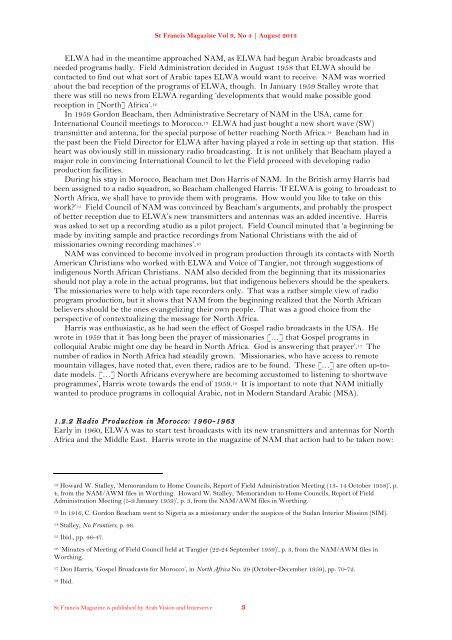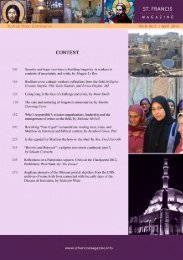Download the pdf - St.Francis Magazine
Download the pdf - St.Francis Magazine
Download the pdf - St.Francis Magazine
Create successful ePaper yourself
Turn your PDF publications into a flip-book with our unique Google optimized e-Paper software.
<strong>St</strong> <strong>Francis</strong> <strong>Magazine</strong> Vol 9, No 4 | August 2013<br />
ELWA had in <strong>the</strong> meantime approached NAM, as ELWA had begun Arabic broadcasts and<br />
needed programs badly. Field Administration decided in August 1958 that ELWA should be<br />
contacted to find out what sort of Arabic tapes ELWA would want to receive. NAM was worried<br />
about <strong>the</strong> bad reception of <strong>the</strong> programs of ELWA, though. In January 1959 <strong>St</strong>alley wrote that<br />
<strong>the</strong>re was still no news from ELWA regarding ‘developments that would make possible good<br />
reception in [North] Africa’. 12<br />
In 1959 Gordon Beacham, <strong>the</strong>n Administrative Secretary of NAM in <strong>the</strong> USA, came for<br />
International Council meetings to Morocco. 13 ELWA had just bought a new short wave (SW)<br />
transmitter and antenna, for <strong>the</strong> special purpose of better reaching North Africa. 14 Beacham had in<br />
<strong>the</strong> past been <strong>the</strong> Field Director for ELWA after having played a role in setting up that station. His<br />
heart was obviously still in missionary radio broadcasting. It is not unlikely that Beacham played a<br />
major role in convincing International Council to let <strong>the</strong> Field proceed with developing radio<br />
production facilities.<br />
During his stay in Morocco, Beacham met Don Harris of NAM. In <strong>the</strong> British army Harris had<br />
been assigned to a radio squadron, so Beacham challenged Harris: ‘If ELWA is going to broadcast to<br />
North Africa, we shall have to provide <strong>the</strong>m with programs. How would you like to take on this<br />
work’ 15 Field Council of NAM was convinced by Beacham’s arguments, and probably <strong>the</strong> prospect<br />
of better reception due to ELWA’s new transmitters and antennas was an added incentive. Harris<br />
was asked to set up a recording studio as a pilot project. Field Council minuted that ‘a beginning be<br />
made by inviting sample and practice recordings from National Christians with <strong>the</strong> aid of<br />
missionaries owning recording machines’. 16<br />
NAM was convinced to become involved in program production through its contacts with North<br />
American Christians who worked with ELWA and Voice of Tangier, not through suggestions of<br />
indigenous North African Christians. NAM also decided from <strong>the</strong> beginning that its missionaries<br />
should not play a role in <strong>the</strong> actual programs, but that indigenous believers should be <strong>the</strong> speakers.<br />
The missionaries were to help with tape recorders only. That was a ra<strong>the</strong>r simple view of radio<br />
program production, but it shows that NAM from <strong>the</strong> beginning realized that <strong>the</strong> North African<br />
believers should be <strong>the</strong> ones evangelizing <strong>the</strong>ir own people. That was a good choice from <strong>the</strong><br />
perspective of contextualizing <strong>the</strong> message for North Africa.<br />
Harris was enthusiastic, as he had seen <strong>the</strong> effect of Gospel radio broadcasts in <strong>the</strong> USA. He<br />
wrote in 1959 that it ‘has long been <strong>the</strong> prayer of missionaries […] that Gospel programs in<br />
colloquial Arabic might one day be heard in North Africa. God is answering that prayer’. 17 The<br />
number of radios in North Africa had steadily grown. ‘Missionaries, who have access to remote<br />
mountain villages, have noted that, even <strong>the</strong>re, radios are to be found. These […] are often up-todate<br />
models. […] North Africans everywhere are becoming accustomed to listening to shortwave<br />
programmes’, Harris wrote towards <strong>the</strong> end of 1959. 18 It is important to note that NAM initially<br />
wanted to produce programs in colloquial Arabic, not in Modern <strong>St</strong>andard Arabic (MSA).<br />
1.2.2 Radio Production in Morocco: 1960-1963<br />
Early in 1960, ELWA was to start test broadcasts with its new transmitters and antennas for North<br />
Africa and <strong>the</strong> Middle East. Harris wrote in <strong>the</strong> magazine of NAM that action had to be taken now:<br />
12 Howard W. <strong>St</strong>alley, ‘Memorandum to Home Councils, Report of Field Administration Meeting (13- 14 October 1958)’, p.<br />
4, from <strong>the</strong> NAM/AWM files in Worthing. Howard W. <strong>St</strong>alley, ‘Memorandum to Home Councils, Report of Field<br />
Administration Meeting (5-9 January 1959)’, p. 3, from <strong>the</strong> NAM/AWM files in Worthing.<br />
13 In 1916, C. Gordon Beacham went to Nigeria as a missionary under <strong>the</strong> auspices of <strong>the</strong> Sudan Interior Mission (SIM).<br />
14 <strong>St</strong>alley, No Frontiers, p. 46.<br />
15 Ibid., pp. 46-47.<br />
16 ‘Minutes of Meeting of Field Council held at Tangier (22-24 September 1959)’, p. 3, from <strong>the</strong> NAM/AWM files in<br />
Worthing.<br />
17 Don Harris, ‘Gospel Broadcasts for Morocco’, in North Africa No. 29 (October-December 1959), pp. 70-72.<br />
18 Ibid.<br />
<strong>St</strong> <strong>Francis</strong> <strong>Magazine</strong> is published by Arab Vision and Interserve 3







![Reflections on Surah Fatiha and the Lord's Prayer[1] - St.Francis ...](https://img.yumpu.com/49377951/1/184x260/reflections-on-surah-fatiha-and-the-lords-prayer1-stfrancis-.jpg?quality=85)









